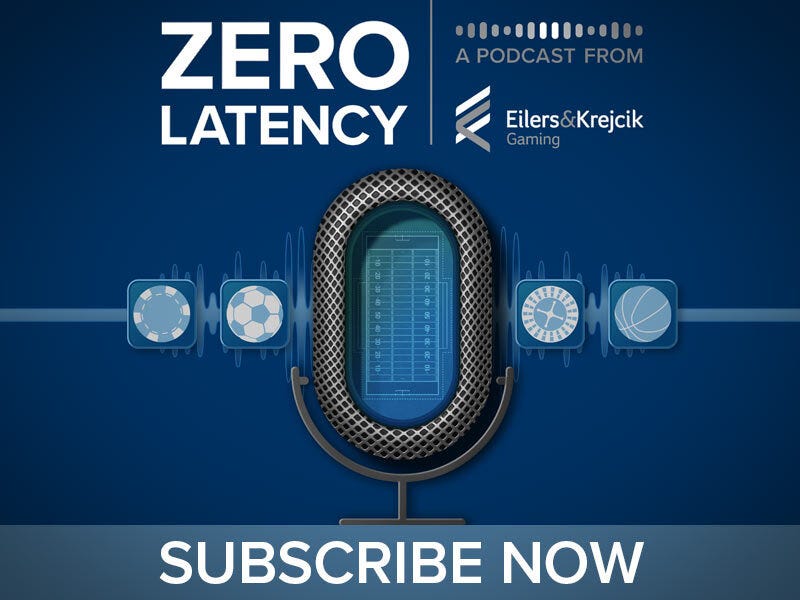A New Era Of US Online Gambling
More than a year in the making, the soon-to-be-released(?) rule changes by the Bureau of Indian Affairs could transform the US online gambling market.
The Bulletin Board
NEWS: Proposed rules by the Bureau of Indian Affairs could bring transformative change to tribal gaming and the US online gambling market.
NEWS: Are new entries eating away at FanDuel and DraftKings’ market share?
NEWS: A newly introduced Mississippi mobile sports betting bill must overcome significant resistance.
LEGISLATIVE NOTES: Online casino bills in Maryland and Maine and a Georgia sports betting hearing.
AROUND the WATERCOOLER: This is 60 Minutes.
STRAY THOUGHTS: RIP Perry Friedman.
SPONSOR’S MESSAGE - Underdog: the most innovative company in sports gaming.
At Underdog we use our own tech stack to create the industry’s most popular games, designing products specifically for the American sports fan.
Join us as we build the future of sports gaming.
Visit: https://underdogfantasy.com/careers
BIA Rules Could Fundamentally Change Tribal Gaming
This entry will be a little more in-the-weeds than usual because the topic requires it. That said, it’s a simplified overview of a rather complex situation.
The Bureau of Indian Affairs is expected to publish its long-awaited rules changes sometime in Q1.
The changes could affect several areas of tribal gaming:
The land-in-trust process
Class III Gambling negotiations
Off-reservation online gambling
Land-in-Trust
Land-in-trust is a critical step in the process tribes must go through to open a casino.
To understand how convoluted the current process is, look no further than the Mashpee Wampanoag tribe in Massachusetts, which I wrote about in August:
“The DOI placed the tribe’s land in trust in 2015. It rescinded that decision in 2018 following a successful lawsuit by Taunton residents. In 2020, District Court Judge Paul L. Friedman stepped in, calling the 2018 DOI decision “arbitrary, capricious, an abuse of discretion and contrary to law.” The DOI dropped its appeal of the ruling in 2021. In 2023, another District Court ruled against the Taunton residents, who filed an appeal with the US Court of Appeals - so this isn’t over yet.”
The proposed rule would make five changes to the land-in-trust process:
It makes it a Department policy to support land-in-trust.
Requires a decision within 120 days of receiving a land-in-trust request.
Streamlines the process for the different forms of acquisitions—on-reservation, contiguous to reservations, off-reservation, and a new fourth category, initial Indian acquisitions for tribes that don’t currently possess land.
Affirms the process for determining whether a tribe was “under federal jurisdiction” in 1934, as required by Carcieri v. Salazar, (2009).
Minor changes designed to “remove obstacles that tribes and individual Indians have faced in the trust acquisition process.
Class III Gambling
The proposed change to Class III gambling negotiations would require a state that has legalized any form of Class III gaming (think casino table games, slot machines, and sports betting) to negotiate in good faith with tribes over all forms of Class III gaming. Basically, if one Class III game is on the table, they all are. There is an exception for gambling that is explicitly illegal in the state.
Online Gambling
The biggest possible change is buried in the proposed Class III gaming rule. As written, tribes would no longer be restricted to online gambling “on tribal lands” if its compact with the state allows for statewide mobile betting. Yes, this proposed rule change is the situation playing out in Florida.
The proposed rule reads:
“The Department's position is that the negotiation between a Tribe and State over Statewide remote wagering or i-gaming falls under these broad categories of criminal and civil jurisdiction. Accordingly, provided that a player is not physically located on another Tribe's Indian lands, a Tribe should have the opportunity to engage in this type of gaming pursuant to a Tribal-State gaming compact.”
As I wrote in Gaming Law Review in April 2023:
“The proposed rule would clarify that the state can determine whether online gaming occurs on tribal lands through law or compact. This is the crux of the current case moving through the federal court system involving the state of Florida and the Seminole Tribe.
“Under the current rules, a tribe's ability to offer statewide mobile betting via compact is enough of a threat that tribes are partnering with states as commercial online gambling operators. If enacted, the state can judge that the wager takes place on tribal lands, providing tribes sovereign immunity even though their gaming operations would now extend well beyond tribal borders.
“Tribes are handcuffed under the current rules. They must either agree to be licensed as commercial online operators or get outmaneuvered by commercial operators.”
FanDuel and DraftKings Hit 14-Month Market Share Low
In a recent EKG Line newsletter, the team at Eilers & Krejcik Gaming (a newsletter sponsor) noted that the duo of FanDuel and DraftKings hit a 14-month revenue low in November 2023 at a combined 69%.
The duo had a 74% share over the three previous months, per EKG’s most recent Sports Betting Market Monitor.
According to EKG, Penn upped its revenue market share to 8% following the transition from the Barstool Sportsbook to ESPN Bet on November 14. Another new launch, Hard Rock Bet in Florida, has boosted Hard Rock’s national market share from a fraction of a percent to 4% overnight.
The EKG team did note that November was a rough month for sportsbooks and likely contributed to the declining market share of the two top dogs. The research firm believes other operators like BetMGM and Caesars are more likely to see their market share decline—the reason: product parity.
SPONSOR’S MESSAGE - SUBSCRIBE NOW to Zero Latency, the new podcast from Eilers & Krejcik Gaming that provides unparalleled insight into the U.S. online gambling industry through interviews with industry insiders and analysis from EKG experts.
Mississippi’s Mobile Betting Bill Will Not Be a Cakewalk
*Correction: I originally listed Mississippi State Rep. Cedric Burnett as the sponsor.
Mississippi Stae Rep. Casey Eure, the chairman of the Gaming Committee, has introduced legislation to legalize mobile betting in the state. HB 774 would allow the state’s casinos to expand into online betting. The bill was approved by the Gaming Committee on Tuesday and is now eligible to be heard on the House floor.
If the bill becomes law, Mississippi would be an operator-friendly mobile betting state. The burdens are small, with an 8% state tax rate on revenue over $134,000 per month and an additional local tax of 4% on revenue over $50,000.
Each casino would have the option to partner with or launch a single online brand.
“If the bill becomes law,” is the big question.
Several concerns were raised during hearings. There was also the Mississippi Mobile-Online Sports Betting Task Force’s final report, which included stakeholder comments like those from Michael Bruffey of Island View Casino Resort.
“Statewide online sports betting will reduce our revenues, it will reduce jobs, and it will harm Mississippi,” Bruffey said. “The end game of the large corporations pushing for online sports betting is full online casino gaming in every state, including Mississippi.”
Don Mitchell, the CFO of Foundation Gaming & Entertainment, which operates two Mississippi casinos, said, “Online sports betting accomplishes none of the goals discussed above and, in fact, will undermine the existing commercial casinos in the state.”
Mitchell stated his belief that online sports betting will:
Increase problem and underage gambling.
Lead to the harassment of student-athletes.
Harm brick-and-mortar casinos.
Legislative Notes: Maryland, Maine, and Georgia
A glance at legislative developments worthy of a mention but not a more extensive entry.
Maryland: State Sen. Ron Watson officially filed two online gambling bills (SB 565 and SB 603) on Friday that would bring online casino games to the state via referendum. A hearing has been scheduled for February 28.
STTP’s previous analysis of Watson’s bill and Maryland’s roadblocks
The problems with a burdensome tax rate (Watson’s bill calls for a 47% tax)
Maine: Legislation allowing the state’s tribes to offer online casino games is on pause for (at least) two weeks to align the original bill with a proposed amendment.
Georgia: The Senate Committee on Economic Development and Tourism held an early morning hearing on SB 386, a bill seeking to legalize sports betting without a constitutional amendment. The measure passed by an 8-2 vote and could be brought up on the Senate floor as early as Thursday.
Around the Watercooler
Social media conversations, rumors, and gossip.
Newsflash: Young men who watch sports also bet on sports! Here’s another newsflash: so do middle-aged men - with or without windbreakers. Although I’ve never seen any polling or survey data break out age and fashion choices. Thanks for that image 60 Minutes.
As expected, the quote retweets are gold. And I’ll hand it off to Chris Grove, to sum up the feelings of most of the industry.
Stray Thoughts
I was saddened to hear of the passing of poker player Perry Friedman last week.
I never met Perry in person, but I did interact with him many times following the launch of Full Tilt Poker. For those who remember, Full Tilt owners and pros had custom avatars and would pop up at all kinds of stakes in the site’s earliest days. I was at FTP from day one for their Razz games, and Perry (as well as Howard Lederer) was a regular at the Razz tables.
Perry talked to everyone and often initiated conversations, and he would talk about everything and anything. He played too loose, but not loose enough to be gifting money or unofficially changing the stakes (we’ve all played in the $5/$10 game that played bigger than the $20/$40 game). Changing the atmosphere of an online table (a Razz table, to boot) is no easy feat, but Perry constantly pulled it off.
When people who knew what I did for a living back then would ask what big names I played with online, Perry’s name was always the first that came to mind.
Lederer also chatted, but it was different; he was a responder. When Gus Hanson launched his poker site, PokerChamps.com, which, unless I’m misremembering, had the first multi-table layout, he would also sit in random games and converse. But again, he was no Perry. That’s not speaking negatively of Gus; it speaks to Perry’s infectiousness, even in a virtual setting.
I highly recommend Poker.org’s article on Perry, and Brad Willis also spent a good amount of The Org newsletter talking about him.
RIP Perry.









I knew Perry. He always had something interesting to say, and he treated me like a somebody when I was a nobody.